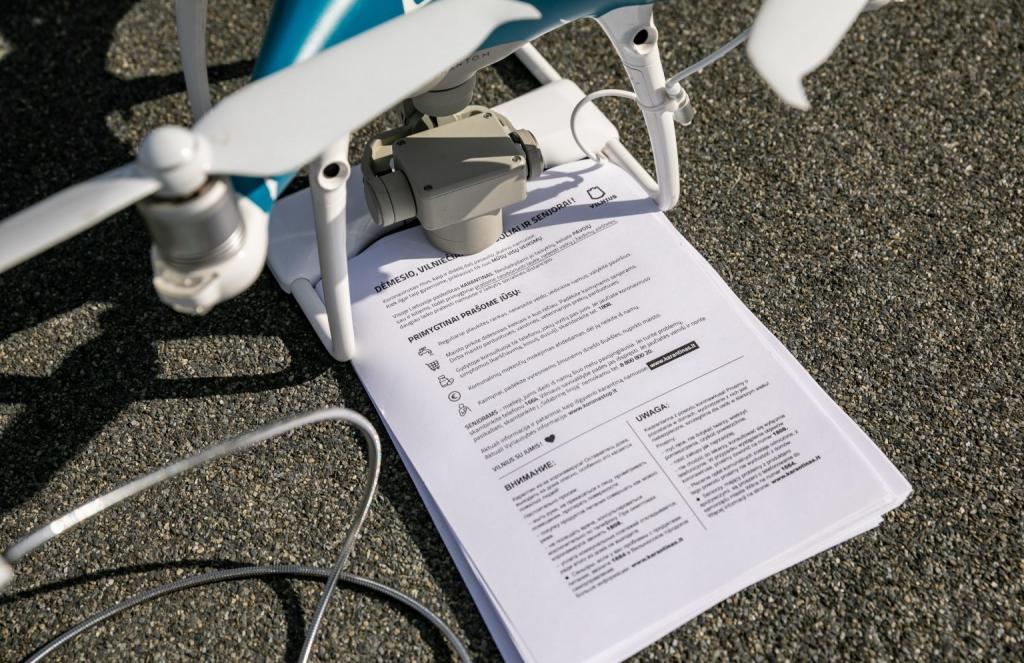Thessaloniki gets ready for its metro launch in November
The underground rapid transit lines have been under construction for almost two decades due to various project delays
 TheMayor.EU logo
TheMayor.EU logo 
city of Vilnius uses drones, Source: City of Vilnius
From the French Riviera to the Black see – learn how EU cities mobilize technology against the pandemic
In the context of a global pandemic and coronavirus spreading so easily from one person to another, it is of utmost importance to design law enforcement and food provision solutions that are both efficient and guarantee maximum protection. Apparently, drones prove to be a preferred technology in the fight against Covid-19 in several countries so far.
The main advantage of the unmanned aerial vehicles lies in the fact that drones can go to places that are hard to reach for humans or vehicles, such as high-rise buildings, narrow streets, obstructed roads, etc.
But the most important upshot of drones is probably that they can limit the face-to-face contact thereby reducing the chances of contamination with the new virus. By replacing mundane tasks, performed by humans, they could also prove to be a time and labour-saving solutions.
Drones can carry cameras, loudspeakers or even small items of first necessity, like groceries, medicines, disinfection products and why not even documents to be signed. Here are some examples of their use in Europe.
Since last week, Spanish police have been utilizing drones to reprimand people who do not respect the social distancing and quarantine rules. As reported by BBC, groups and individuals in the parks of Madrid have been disciplined by police officers using the flying machines from a safe distance.
A few days later, the same approach was undertaken by police on the French Riviera. For instance, policemen in Nice and Cannes have been issuing orders and sending safety instructions with drones to enforce the lockdown.
Similarly, the Lithuanian capital Vilnius, too, has been issuing information to older citizens, informing them that they should stay home with flyers delivered by drone.
On top of this, the Municipality of Burgas, a seaside city in Bulgaria, announced that it will be measuring the temperature of its citizens with a thermometric camera placed on a drone. This will take place mostly in the city areas with predominant Roma population, where people live in cramped surroundings and sanitary conditions are low.
And how about your city? Do you know of any interesting use of drones in the fight against Covid-19? Let us know at office@themayor.eu

The underground rapid transit lines have been under construction for almost two decades due to various project delays

Now you can get your wine in Talence by paying directly in Bitcoin

That’s because the state has to spend money on updating the railway infrastructure rather than subsidizing the cost of the popular pass

Rethinking renewable energy sources for the urban landscape

The examples, compiled by Beyond Fossil Fuels, can inform and inspire communities and entrepreneurs that still feel trepidation at the prospect of energy transition

Now you can get your wine in Talence by paying directly in Bitcoin

The 10th European Conference on Sustainable Cities and Towns (ESCT) sets the stage for stronger cooperation between the EU, national and local level to fast track Europe's transition to climate neutrality.

At least, that’s the promise made by the mayor of Paris, Anne Hidalgo

The underground rapid transit lines have been under construction for almost two decades due to various project delays

At least, that’s the promise made by the mayor of Paris, Anne Hidalgo

Hostal de Pinós is located in the geographical centre of the autonomous region

Despite its church-y name, the district has long been known as the hangout spot for the artsy crowds

Urban dwellers across the EU are having a say in making their surroundings friendlier to people and the environment.

Forests in the EU can help green the European construction industry and bolster a continent-wide push for architectural improvements.

Apply by 10 November and do your part for the transformation of European public spaces

An interview with the Mayor of a Polish city that seeks to reinvent itself

An interview with the newly elected ICLEI President and Mayor of Malmö

A conversation with the Mayor of Lisbon about the spirit and dimensions of innovation present in the Portuguese capital














